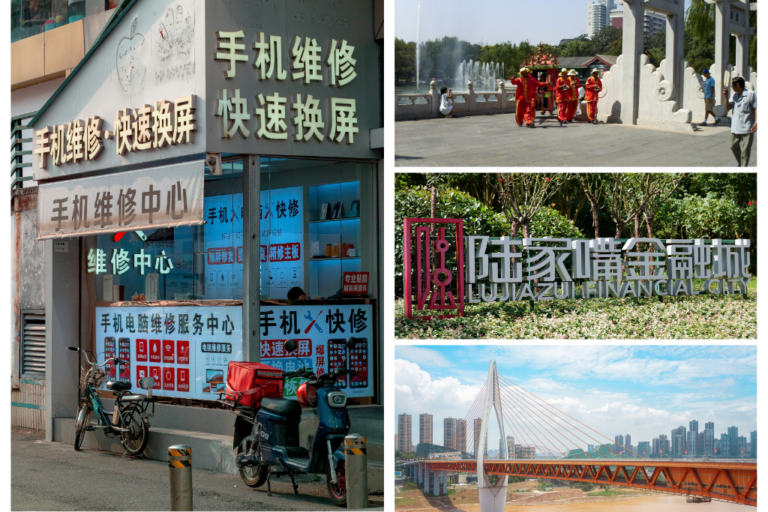How to work in China: Opportunities and requirements
Discover how to work in China: requirements, visas, and job opportunities for foreigners in a market full of possibilities.
Working in China has become one of the most appealing options for professionals around the world. With a rapidly growing economy, modern cities like Shanghai, Beijing, and Shenzhen, and strong demand for foreign talent in fields such as technology, education, engineering, and business, opportunities to work in China are more diverse than ever.
However, before making the move, it’s essential to understand the legal requirements, the types of visas available, and the real opportunities for foreigners looking to build their careers in China.
Advantages of working in China
Working in China is not just about joining one of the fastest-growing economies in the world. It is also a chance to enjoy career and lifestyle benefits that attract professionals from everywhere. With strong job security, attractive salaries, and opportunities to grow in a truly international environment, a career in China offers much more than just financial rewards.
Here are the main reasons why working in this country can be an excellent decision.
- Competitive income for foreigners: Foreign professionals, particularly in fields like language teaching, finance, or technology, often earn salaries above the local average and enjoy additional perks such as housing or insurance.
- Steady economic growth: China is the world’s second-largest economy and continues to grow, creating a wealth of job opportunities in key sectors such as technology, trade, engineering, and education.
- Attractive employee benefits: Many companies offer packages that cover housing, transportation, health insurance, and even annual flights back to your home country.
- Variable cost of living: While cities like Shanghai and Beijing can be expensive, other cities such as Chengdu, Xi’an, or Wuhan offer a good quality of life at more affordable costs, making it easier to save.
- Safe and stable environment: China is considered one of the safest countries in the world when it comes to everyday crime, giving peace of mind to those living and working there.
- Job and economic stability: China’s strong labor market provides stability for foreigners who meet visa requirements and work in high-demand sectors.
- Active international community: In major cities, expat communities make it easier to settle in, build professional networks, and enjoy cultural exchange.
- High-quality infrastructure: China offers modern transportation, efficient public services, and innovative cities, all of which contribute to a comfortable urban lifestyle.
- Opportunities for professional growth: Working in China provides experience in a competitive, international environment, which can boost your career on a global scale.
- Cultural enrichment: Living and working in China opens the door to learning Mandarin, exploring a rich and ancient culture, and broadening your personal and professional perspective.
Requirements for working in China
If you’re thinking about working in China, it’s essential to know what’s required of foreigners. While it might seem daunting at first, having the right information and planning ahead makes the process much easier.

- Work visa (Z Visa): This is the key document you need to enter China for work. Authorities only grant it if you have a valid job contract and a sponsoring company. Once you arrive in the country, you must convert it into a residence permit.
- Work permit for foreigners: After securing your visa, you’ll need to apply for a Foreign Work Permit. This permit confirms that you meet all the requirements to work legally in China.
- Prior job offer: To apply for a work visa in China, you need a formal job offer from a company registered in the country. This company will handle part of the application process on your behalf.
- Academic qualifications and experience: In general, employers require a university degree and at least two years of relevant work experience. For language teachers, certifications like TEFL or TESOL are often also needed.
- Criminal record certificate: The authorities require you to provide a document showing that you have no criminal record in your home country.
- Medical examination: To obtain a residence permit, you must undergo a medical examination to confirm that you are in good health.
- Valid passport: Your passport must be valid for at least six months and have several blank pages for visas and permits.
- Registry at the local police station: Once you arrive in China, you must register at the local police station within 24 hours of your arrival.
- Residence permit: This document replaces your initial visa and allows you to live and work in China for the duration of your contract. The process is handled at the Public Security Bureau’s Entry-Exit Office (PSB) in the city where you live.
Tips for starting work in China
- Prepare for your arrival with internet access from the start: Remember that popular Western apps like Google, Facebook, WhatsApp, and Instagram don’t work in China. To stay online, you’ll need a good VPN and a Holafly China eSIM, which lets you connect immediately without having to worry about local SIM cards.
- Learn the basics of Mandarin: While you can get by with English in major cities, knowing some basic Mandarin phrases will make daily life much easier and show respect for the local culture.
- Always verify the legality of the job offer: Always check that the company is officially registered and allowed to hire foreign workers. Avoid offers that ask you to work on a tourist or business visa, since that is against the law.
- Negotiate your contract carefully: Make sure everything is clearly written down, including salary, benefits, health insurance, housing if it is provided, vacation time, and termination clauses. This will help prevent misunderstandings.
- Learn about taxes: Foreigners in China are also required to pay income taxes. Check whether your employer will handle them or if you are responsible for managing them yourself.
- Adapt to Chinese work culture: Punctuality, respect for hierarchy, and teamwork are highly valued. It is also common for workdays to be longer than in other countries.
- Connect with the expat community: In cities like Beijing, Shanghai, and Shenzhen, there are vibrant international communities that provide support, networking opportunities, and helpful advice.
- Get your documents in order: Never work on the wrong visa. Doing so could lead to fines, deportation, or even a ban from re-entering the country.
- Learn about the healthcare system: Even if your company provides health insurance, it’s a good idea to check what it covers and whether you might need additional international coverage.
- Open a local bank account: It will make receiving your salary, transferring money, and using mobile payment apps like WeChat Pay or Alipay much easier, which are essential for daily life.
Types of jobs in China for foreigners
A career in China can offer many opportunities, but not every industry is open to foreigners. Most openings are in areas where companies need international expertise or specialized skills that are scarce locally. Here are some of the most common jobs for foreigners in China:
- Technology and engineering: China is at the forefront of technological innovation, making it a great place for professionals in software, artificial intelligence, telecommunications, and engineering to find strong opportunities.
- Language teaching (mainly English): Teaching is the most common job for foreigners. English teachers, especially those with TEFL or TESOL certifications, are in high demand at schools, universities, and private language centers.
- Business and international trade: Many Chinese companies that export goods hire foreigners to manage international business relations, logistics, and sales.
- Finance and banking: In cities like Shanghai and Beijing, there are opportunities for professionals in investment banking, financial analysis, and international consulting.
- Marketing and international communication: Companies targeting international markets value professionals who can tailor campaigns and manage cross-cultural communication.
- Research and higher education: Universities and research institutes offer positions to academics and scientists with doctoral degrees or specialized experience.
- Hospitality and tourism: Foreigners can find opportunities in international hotels, airlines, and travel agencies, particularly in roles that involve serving international clients.
- Creative industries: Although less common, there are opportunities for designers, artists, and media professionals, especially on projects with a global focus.
The jobs with the highest demand in China for foreigners
Finding a job as a foreigner isn’t always easy, but some fields offer more opportunities due to a lack of local experts or the need for international experience. These are some of the most in-demand roles right now:

- English and other foreign language teachers: Language teaching remains the most in-demand field for foreigners, particularly in private schools, universities, and language academies.
- Technology and IT specialists: Professionals in software development, artificial intelligence, cybersecurity, and big data have great opportunities, especially in Shenzhen, Beijing, and Shanghai.
- Engineers: Engineers in mechanical, civil, electronic, and automotive fields are in high demand at Chinese companies involved in global projects.
- International trade and business professionals: Export and import companies often hire foreigners to manage international client relationships and help expand into overseas markets.
- Finance and banking: The country’s major financial centers highly value financial analysts, consultants, and experts in international banking.
- Marketing and intercultural communication: Companies need professionals who understand international markets and can tailor global communication strategies.
- Researchers and academics: Universities and research centers look for PhDs and specialists to drive projects in science, healthcare, energy, and technology.
- Foreigners with experience in customer service are welcome in international hotels, cruise lines, and travel agencies, particularly in roles related to tourism marketing and international sales.
Salaries and cost of living in China
Salaries for foreigners in China vary widely depending on the city, industry, and level of experience. In general, foreigners tend to earn more than the local average, especially in specialized roles or language teaching positions.
English teachers can earn between $1,500-3,000 per month, often with perks like housing, health insurance, or paid flights. Tech and engineering professionals typically make $3,000-6,000 per month, with higher salaries for highly specialized roles. Executives in finance and international trade can earn $4,000-8,000 monthly, sometimes with bonuses and additional benefits. Jobs in tourism and hospitality generally range from $1,200-2,500 per month, depending on the position and city.
Living costs in China vary a lot depending on the city. In pricey cities like Shanghai or Beijing, foreigners usually need around $1,200-2,000 a month for rent, food, transport, and leisure. In smaller, more affordable cities like Chengdu, Wuhan, or Xi’an, you can live comfortably on $800-1,200 per month. Rent is typically the biggest expense, with central Shanghai apartments costing over $800, while in smaller cities, $300-500 is common.
Important: If you are a frequent traveler and want to stay connected without worrying about expensive roaming or looking for a new SIM at every destination, Holafly’s subscription plans are for you. With a single eSIM, enjoy internet in more than 170 countries for a fixed price and no surprises on your bill. Travel without limits and connect easily and securely! 🚀🌍

Where can you find job opportunities in China?
Landing a job in China takes careful planning, as the country has strict rules for hiring foreigners. Here are the most effective and realistic ways to access job opportunities:
- Online job platforms: There are several specialized job portals where Chinese companies post openings for foreigners. eChinacities is the most well known, offering positions in teaching, tech, business, and more. China Job is an official government linked site focused on foreign hires. Local platforms like Zhaopin and 51Job have thousands of listings, most in Chinese, but some target international candidates. LinkedIn China, although limited, is still a useful option for executive and specialized roles.
- Employment and recruitment agencies: Many companies use agencies to recruit foreign talent. Some well-known ones include Foreign HR, which specializes in placing foreign professionals in Chinese companies; Hays China, an international consultancy based in Shanghai and Beijing focusing on qualified candidates; and Michael Page China, a global agency with opportunities in finance, engineering, and marketing.
- Language teaching programs: China continues to have strong demand for English teachers, and there are programs that connect foreigners with schools and universities, such as Teach Away and EF English First China Teaching Jobs.
- Government job fairs and recruitment events: Cities like Shanghai, Shenzhen, and Beijing host international job fairs where local companies seek foreign talent. The China Job Fair for Foreigners, held several times a year, also gives candidates the chance to connect directly with Chinese employers.
- Networking and expat communities: Networking is essential in China. WeChat groups, forums like Internations, and expat communities make it easier to find opportunities and connect directly with employers.
- International cooperation programs: Some Chinese universities and institutions hire foreign teachers, researchers, or specialists through agreements with other countries. Official embassy websites and education ministry portals usually list these programs.
Frequently asked questions about working in China
To work legally in China, you need a Z visa. After you arrive, it is converted into a residence permit that lasts for the length of your contract.
It really depends on the field. English is sufficient for language teaching or international companies, but if you’re working in local business, sales, or customer service, knowing at least some Mandarin is a big plus
No. If you work with a visa other than a Z visa, the authorities can fine you, deport you, or even ban you from entering the country.
Generally, you’ll need a valid passport, a job contract, a university degree, work experience, a clean criminal record, a medical exam, and a Foreign Work Permit.
Yes. China is considered one of the safest countries when it comes to everyday crime. That said, state control and internet restrictions are factors to keep in mind.





 Language
Language 


















 No results found
No results found








